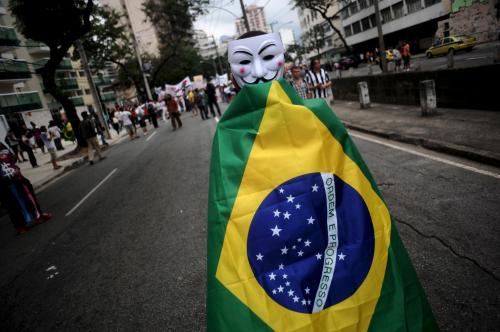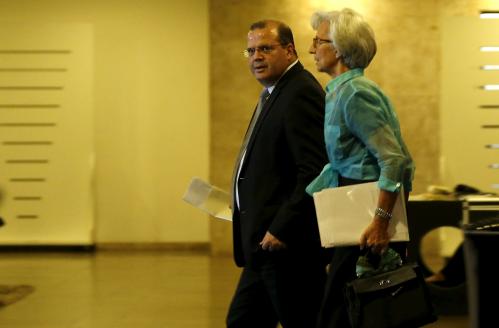The Spanish version of this article was first published in El País of Madrid on October 25, 2016.
Imagine that the Brazilian economy were growing at robust rates, as in 2010. Try to imagine, too, that the Petrobras corruption scandal had never seen the light of day. Finally, go back to the time when former President Dilma Rousseff still enjoyed broad popular and congressional support. In short, imagine that Brazil were not undergoing a deep economic and political crisis. Would you still support Rousseff’s impeachment?
If the answer to this question is no, then clearly something has gone wrong in Brazil. Why? Because Rousseff was not removed over her administration’s economic mismanagement. Neither was she ousted over her involvement in corruption scandals, kickback schemes or obstruction of justice in the Petrobras case, as the evidence to corroborate these charges is nonexistent. The truth of the matter is that Rousseff was ousted over having overseen two types of allegedly unlawful budgetary maneuvers: (1) “pedaladas fiscais,” the delay of repayments to state banks intended to mask the fiscal deficit, and (2) issuing decrees to open supplementary lines of credit without congressional approval.
Let’s begin by looking at the legal framework. In Brazil, the president can only be removed from office via impeachment—revoking the popular mandate that elected her in the first place—when there is evidence that she actively committed a so-called “crime of responsibility.” This is clearly stated by article 85 of the Brazilian Federal Constitution. Crimes of responsibility are defined exhaustively by Law 10179/50 and are not open to interpretation by extension or analogy.
While there exists a legitimate debate about whether the budget tricks Rousseff was accused of truly constitute impeachable offenses, the fact is Brazil’s Supreme Court laid the matter to rest this past April—before the case was tried in the Lower House but after a special commission recommended impeachment—when it denied the attorney general’s motion to nullify the impeachment case on due process grounds. The Supreme Court does not have the authority to rule on the political merits of an impeachment, but it does have the last word on technical and procedural matters. Even though it has been argued that neither fiscal “peddling” nor the unauthorized decrees can be unambiguously considered impeachable offenses and therefore that the removal may have been unconstitutional, by letting it run its course the Supreme Court effectively ratified the formal legitimacy of the impeachment trial.
Formal legitimacy notwithstanding, the process in question may still have been tainted by illegitimacy of origin. Indeed, the case has all the markings of an impeachment born out of a political decision to sack a highly unpopular president that had lost parliamentary majorities, incapable of governing a country mired in a deep economic crisis and unwilling to halt the criminal probes weighing on her accusers. Once this decision was made, what followed was simply the search for a pretext that would comply with the formal requirements of an impeachment. The budgetary irregularities that officially led to Rousseff’s downfall likely would never have seen the light of day had the economic and political context been different—especially as this sort of creative accounting has been standard in all of Brazil’s past administrations.
In other words, formal devices were used to recreate the consequences that low public approval and/or the loss of a congressional majority would have in a parliamentary regime. In the end, this amounts to a de facto “parliamentarization” of a presidential system. What’s wrong with that? According to the Brazilian Constitution, neither low public approval nor the loss of a congressional majority constitute impeachable offenses. Unlike the vote of no-confidence or a censure motion—which are features of parliamentary systems—impeachment is a legal procedure, not a political one.
The question we should ask ourselves is whether this practice of de facto “parliamentarizing” presidential systems is truly healthy for democracy. One may think that what Brazil needs is a switch to a parliamentary regime de jure. However, it has been well established that the state of the economy strongly influences electoral results, such that high economic volatility translates directly into high political volatility. In light of the elevated structural economic volatility to which both Brazil and much of Latin America are subjected to—because these economies are exposed to commodity price fluctuations and other external shocks to a greater extent than countries in other regions—parliamentarism might deliver even more unstable politics than the current system.
Which means that, at least for Brazil, presidentialism may be the most sensible choice. But if so, then we must abide by presidentialism’s rules of the game, both formally and in spirit, even if at times they operate against our best interests or we wished they were different. Otherwise we risk making a mockery of institutions and, as the saying in Spanish goes, “he who plays with fire, eventually gets burned.”
The Brookings Institution is committed to quality, independence, and impact.
We are supported by a diverse array of funders. In line with our values and policies, each Brookings publication represents the sole views of its author(s).







Commentary
“Parliamentarism” in disguise
Dilma Rousseff’s impeachment raises serious institutional questions
November 1, 2016